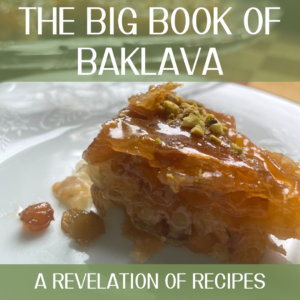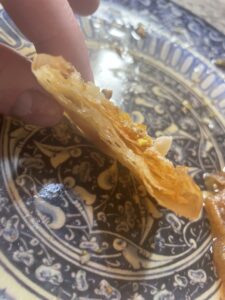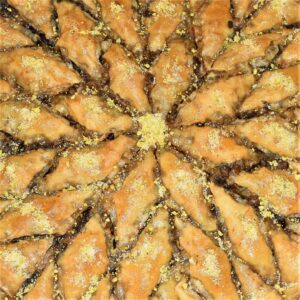
In 2020, I became aware of two manuscripts that had been translated and published in 2018 and 2017. First is the Persian cookbook Kar-name (The Manual), a set of recipes written down by a the Persian Chef Bavarchi upon his return from haj for his lord, Shah Ishmael in 1521. The second Maddat ol-Hayat Resaleh dar Elm-e Tabbakhi (The Substance of Life: A Treatise on the Science of Cooking), 1594, was also written by a chef (Nurollah) upon returning from haj for Shah Abbas I in the late 16th Century, so subsequent to the first. The manual by Bavarchi is by far a much more detailed and thorough work, the second being less precise, and if I may be so bold as to say, seems like it could have been a plagiarized version of Bavarchi‘s work.
All of these are sources were underlined by information found in a Syrian cookbook edited and translated by Charles Perry, the original manuscript from the golden age of the 13th century called Scents and Flavors the Banqueter Favors Kitāb al-Wuşlah ilā l-Habib. Several iterations of this book have come down through the ages, including this 13th C version. In this work is a recipe that Charles Perry points out and names as a “proto baklava” called “qarni yaruk” or “eat and give thanks.”
Today, this is known in Turkey as a stuffed eggplant dish, and I’m sure causes a great deal of confusion when you use it in conjunction with baklava. The baklava version of this dish is found in a chapter on sweets and baked goods. It is a very simple form of baklava; the yufka is folded multiple times and fried and garnished with chopped nuts and doused in syrup. The folding results with a layering that is flaky and light, likely the source of its name, which is “Split belly” in English. Other recipes in that source follow in a similar vein.

Come Along for the ride, stay for dessert
As I go along this baklava adventure, I will share with you the various recipes that I have worked on that originate from these books, as well as the supporting documentation, research, and sources. Much of my supporting work can be found in a video on YouTube The Sultan of Sweets. This 30-minute video will walk you through a power point on the highlights of my early research.
My goal is to build upon what I’ve learned and stretch my knowledge as far as it will go (no pun intended). If you’d like to support my work, feel free to visit my GoFundMe “For the Love of Baklava.”
This February, I am joining a group of friends in Türkiye and will be launching on a research trip to learn as much as I can—not only of the ancient form of baklava, but even its modern iterations. I will be there from February 28 until March 20, and during that time, will get to spend many hours in the kitchens of amazing baklava chefs, food, historians, and hopefully everyday people who make and love baklava. Please follow my story as I go, for it will start here, and I do not know where it will end, but it will certainly be sweet! Thank you for joining me. Come back again soon.
Afiyet Olsun! Bonne Appetit!
Channon Mondoux Jan 31, 2023
